|
|
|
Sort Order |
|
|
|
Items / Page
|
|
|
|
|
|
|
| Srl | Item |
| 1 |
ID:
158674
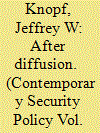

|
|
|
|
|
| Summary/Abstract |
This article discusses six challenges to enforcing norms regarding nuclear weapons. Three challenges reflect generic problems in international politics. These are differences in power, the collective action problem, and trade-offs with other interests. Three additional dilemmas reflect specific characteristics of the nuclear realm. First, membership in international treaties connected to the norms is not universal, raising questions about the appropriateness of enforcement against states that have not signed the treaties. Second, different implications of the norms can come into conflict with each other. In particular, there can be tensions between the requirements of nonproliferation and disarmament norms. Finally, some common options for norm enforcement become quite problematic when dealing with nuclear weapons. For example, if states respond to defections by starting their own nuclear weapons programs, this tit-for-tat response would defeat the purposes of the nonproliferation regime. Despite these challenges, nuclear norms enjoy widespread support and some enforcement is possible.
|
|
|
|
|
|
|
|
|
|
|
|
|
|
|
|
| 2 |
ID:
105135
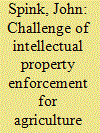

|
|
|
|
|
| Publication |
2011.
|
| Summary/Abstract |
One often-overlooked aspect of intellectual property rights (IPR) strategy is the deterrence and enforcement against 'irresponsible defendants' including product counterfeiters. When applied to food, the consumer product fraud or product counterfeiting is referred to as food fraud, or economically motivated adulteration. While this problem is not unique to agriculture and food products, there are special circumstances and issues to consider. The objectives of this paper are to: (1) review the underlying fraud opportunities (complex and on a massive scale), including an exploration of types of fraudsters and types of fraud (near infinite); (2) review how globalization and source economies contribute to the problem; (3) review the complexity and challenges of enforcement for companies and agencies; and (4) introduce the 'chemistry of the crime' or the 'crime triangle', to shift the focus from reactionary intervention and response to proactive prevention. Five applicable case studies are included, bringing insights on the irresponsible nature of many of the fraudsters. Through its review of fraudsters and types of fraud, this study will provide information to assist with IP technology transfers and the effective enforcement of IPR. Product counterfeiting often poses a very serious public health and economic threat to agriculture and food products. There are very motivated, intelligent, resilient and aggressive fraudsters, but they can be deterred by companies or agencies focused on reducing fraud opportunities. Standard business practices-even identified best practices-often inadvertently contribute to fraud opportunities.
|
|
|
|
|
|
|
|
|
|
|
|
|
|
|
|
| 3 |
ID:
146887


|
|
|
|
|
| Summary/Abstract |
For more than two decades, under the imperative of ‘developing the country at all costs’, local governments in China have allowed developers and industrialists to set up polluting industries which have had deleterious effects on citizens’ health and the natural environment. However, China appears to have entered a new phase of determined and concerted efforts on the part of both the authorities and the public to tackle environmental problems. The articles in this special issue of China Information examine the main strengths and weaknesses of China’s current system of environmental governance. The central questions linking the case studies reported here are concerned with whether and how environmental policies formulated at the central level are implemented at the local level and how different agents and interests, making use of the available legislative means, influence this implementation process. Engaging a range of political, economic, social and cultural perspectives, the five contributions in this collection concentrate on two broad issues: resolution mechanisms for public participation in environmental governance and the actual enforcement of environmental regulations.
|
|
|
|
|
|
|
|
|
|
|
|
|
|
|
|
| 4 |
ID:
099168


|
|
|
|
|
| Publication |
2010.
|
| Summary/Abstract |
One of the ground-breaking features of the World Trade Organization (WTO) Agreement on Trade-Related Aspects of Intellectual Property Rights (TRIPS) is its part III on the enforcement of intellectual property (IP) rights. In early 2009, the first WTO Dispute Settlement Panel Report primarily addressed obligations on IP enforcement. Here, the technical success of the US border measures claim comes with a crucial limitation: those Chinese measures that cover basically all of the commercially relevant activity are ab initio excluded from the panel's findings. Because they go beyond the minimum standards of TRIPS, the panel relied on one of the few TRIPS provisions that specify the relevance of TRIPS for additional "TRIPS-Plus" IP protection and enforcement. Given that such "TRIPS-Plus" measures are increasingly common in national laws and international treaties, it is time to take a closer look at how TRIPS addresses TRIPS-Plus IP protection. With a focus on border measures, I conclude that TRIPS contains not only minimum but also maximum standards or "ceilings" that impose limits on additional IP protection and enforcement. Such ceilings in TRIPS can function as limits for further extensions of IP protection and enforcement-as currently negotiated under a proposed Anti-Counterfeiting Trade Agreement or relating to border measures against generic drugs in transit.
|
|
|
|
|
|
|
|
|
|
|
|
|
|
|
|
| 5 |
ID:
086201
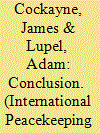

|
|
|
|
|
| Publication |
2009.
|
| Summary/Abstract |
This conclusion reviews the Special Issue's perspective on organized crime as both potential 'enemy' and 'ally' of peace processes. The social and economic power wielded by organized crime is highlighted, pointing to the role that peace operations play as an intervening variable between individuals/communities and the environments in which they operate. Peace operations use a range of tactics, from coercion to co-option, working with or against organized crime. However, these tactics will only be successful if they are framed within a coherent strategy, which may pursue either containment or transformation - or seek to combine them - through a phased transitional strategy. Peace operations should be a key component in a broad strategy of intelligent international law enforcement.
|
|
|
|
|
|
|
|
|
|
|
|
|
|
|
|
| 6 |
ID:
113823
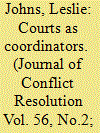

|
|
|
|
|
| Publication |
2012.
|
| Summary/Abstract |
Why do states build international courts, submit cases, and enforce court judgments? This article examines the role of a court that is neither a "decider" nor an "information provider." Litigation is costly and does not reveal private information. The court's ruling is not binding and bargaining can occur before and after the court has ruled. Nevertheless, an alternative dispute resolution mechanism emerges: court rulings can coordinate endogenous multilateral enforcement. Disinterested states will enforce to ensure that they can profitably use the court in the future. Accepting jurisdiction of the court allows a state to make efficiency-enhancing "trades," winning high-value disputes in exchange for losing low-value disputes. This is possible because litigation is a screening device: states only sue when they derive relatively high value from the disputed asset. The use of the court as a coordination device for multilateral enforcement allows for the existence of a court with endogenous enforcement and jurisdiction.
|
|
|
|
|
|
|
|
|
|
|
|
|
|
|
|
| 7 |
ID:
146891
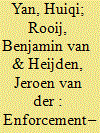

|
|
|
|
|
| Summary/Abstract |
This article, in a study of amoral cost–benefit analysis, legitimacy and capacity to obey the law, seeks to understand why Chinese farmers obey or break pesticide rules. It uses data gathered through intensive fieldwork at a local level, including interviews with 31 pesticide experts and officials and 119 vegetable farmers in central China. It uncovers an enforcement–compliance paradox: a situation where law enforcement concentrates exactly on those rules that are least likely to be broken and on those regulated actors who are most likely to comply. It finds two explanations. First, enforcement policy simply may not be aware of which rules are more likely to be complied with and which regulated actors are more likely to comply even when there is limited deterrence. Second, technocratic risk-averse enforcement policy may be oriented towards those rules and actors for which violation – theoretically – results in the greatest damage, not towards those rules that are more likely to be broken and those actors who are more likely to break them.
|
|
|
|
|
|
|
|
|
|
|
|
|
|
|
|
| 8 |
ID:
075224
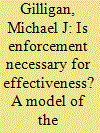

|
|
|
|
|
| Publication |
2006.
|
| Summary/Abstract |
Recently, scholars have questioned whether enforcement mechanisms are necessary to make regimes effective. This article provides a model of the international criminal regime in which the regime changes state behavior even though it possesses no enforcement mechanisms. The article also answers several prominent criticisms of the International Criminal Court (ICC). Critics claim that the ICC is at best futile because it lacks the power to apprehend the criminals it is meant to prosecute. Even worse, the ICC may be harmful because it will induce atrocious leaders to hold on to power longer than they would if they could step down with immunity for past crimes. The model in this article suggests those criticisms may be inaccurate. I model the interaction between a leader and a foreign state that has the option of offering that leader asylum. I examine the effect of the creation of an ICC-like institution on that interaction. The model produces three main findings. (1) Leaders' reigns will not be prolonged as a result of the regime. (2) Although the institution has no enforcement power, some leaders (those with such a high probability of being deposed that they would willingly surrender to the institution rather than try to stay in office) will be punished by it. In those circumstances, the foreign state has no incentive to offer the leader asylum. (3) The institution may deter some atrocities at the margin.
|
|
|
|
|
|
|
|
|
|
|
|
|
|
|
|
| 9 |
ID:
150237
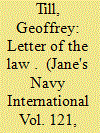

|
|
|
| 10 |
ID:
125204


|
|
|
|
|
| Publication |
2013.
|
| Summary/Abstract |
Vietnam's rural provinces are home to thousands of craft villages; communities engaged in small- and medium-scale manufacturing of a range of goods, from recycled paper products to processed food. Since the liberalization of the Vietnamese economy in 1986, craft villages have played a significant role in poverty reduction and livelihood diversification for rural households, and currently employ nearly one-third of Vietnam's rural labor force. However, the rapid expansion of craft manufacturing, combined with a lack of planning, has brought increased air, soil, and water pollution to craft villages and surrounding areas. Pollution levels are now so serious that they pose a major risk to local health and agriculture. This article examines why producers continue to expose themselves to environmental pollution and its associated health risks. Drawing on four case studies of craft villages in the Red River Delta region of northern Vietnam, the authors find that risk is a multidimensional phenomenon. Craft production typically involves a value chain of closely connected family economic units and takes place against a backdrop of fierce competition for market share both within Vietnam and elsewhere in Asia. In this context, the current policy of managing the environmental risks of pollution through regulation requires producers to take risks in other domains of equal or greater importance to them; their livelihoods and social relations. Craft producers make explicit trade-offs between the risks of ill health and the security that family and community ties provide in the face of uncertain production space, markets, and livelihoods. These findings highlight the importance of thinking
|
|
|
|
|
|
|
|
|
|
|
|
|
|
|
|
| 11 |
ID:
191979


|
|
|
|
|
| Summary/Abstract |
Incidents of noncompliance with existing multilateral arms-control treaties and subsequent enforcement actions can help to inform the design of future treaties. This article uses examples of noncompliance with the 1972 Biological and Toxin Weapons Convention, 1993 Chemical Weapons Convention, and 1968 Treaty on the Non-Proliferation of Nuclear Weapons to identify factors that have determined the nature of compliance-enforcement actions. The punitivist model of treaty design and enforcement is introduced and is used alongside the established transformationalist and managerialist models to analyze incidents of noncompliance and identify factors shaping compliance-enforcement actions. Two such factors are found to play important roles: the scale of acts of noncompliance and the identity of the perpetrator. The scale of the act of noncompliance dictates whether the compliance-enforcement actions specified in the treaty text are followed. Responses to large-scale acts do follow the treaty-specified actions, while the small-scale acts analyzed in this article all elicit a managerialist response of consultation and cooperation, regardless of actions stipulated in the treaty text. In all cases, the identity of the perpetrator is crucial: the permanent members of the UN Security Council and their allies are fundamentally impervious to punitive measures.
|
|
|
|
|
|
|
|
|
|
|
|
|
|
|
|
| 12 |
ID:
160922
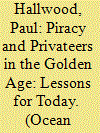

|
|
|
|
|
| Summary/Abstract |
Customary international law has governed high seas piracy for many centuries and is now codified in the United Nations Convention on the Law of the Sea (LOSC). In this article, we discuss the reasons why enforcement against piracy today is less effective than three hundred years ago. We contend that crime, including the crime of piracy, can be modeled as a rational choice that is responsive to expected rewards and punishments. Based on this view, we argue that three hundred years ago, the free rider problem resulting from enforcement on the high seas was less prevalent than it is today because seaborne trade was more concentrated in the vessels of a few countries, making enforcement more like internal than international policing. The persistence of piracy today also stems from a continuing low probability of capture coupled with lenient punishments. In addition to enforcement differences, we contrast the sources of piracy in the two eras—in the earlier period, the end of privateering led many privateers to engage in piracy, whereas today, the main source of pirates in the Western Indian Ocean is the existence of a “failed state,” and off West Africa and South East Asia pirates are common criminals.
|
|
|
|
|
|
|
|
|
|
|
|
|
|
|
|
| 13 |
ID:
114559
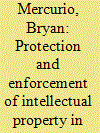

|
|
|
|
|
| Publication |
2012.
|
| Summary/Abstract |
China is without a doubt the world's leading infringer of intellectual property rights (IPRs). China's factories produce counterfeit and pirated products for local and foreign consumption while China's domestic industry infringes patent rights with relative impunity - this despite nearly 30 years of improving laws for the protection and enforcement of IPRs as well as accession to the World Trade Organization in 2001. This brief article seeks to understand the reasons behind China's apparent failure to adequately enforce its IPRs. Finding local protectionism a major impediment to enforcement efforts, the article further analyses whether the central government has the power to enforce IPRs or whether it is powerless to confront and challenge local interests.
|
|
|
|
|
|
|
|
|
|
|
|
|
|
|
|
| 14 |
ID:
093681
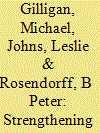

|
|
|
|
|
| Publication |
2010.
|
| Summary/Abstract |
How does variation in the strength of a court's jurisdiction and enforcement affect strategic behavior by states involved in international disputes? The authors construct a formal model and identify three important ways that legal institutions can have a deleterious effect on international cooperation by magnifying the bargaining problems arising from incomplete information about the quality of the legal claims. First, strong courts create less information revelation in pretrial bargaining. Second, strong courts reduce the likelihood of pretrial settlements between states. Third, strong courts lead to more brinksmanship over high-value assets, which leads to conflict if the court refuses to intervene. The authors argue that a key policy implication of their model is that attempts to strengthen international courts must be accompanied by increased precision of international law to ameliorate the deleterious effects of strong courts.
|
|
|
|
|
|
|
|
|
|
|
|
|
|
|
|
| 15 |
ID:
099884
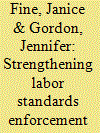

|
|
|
|
|
| Publication |
2010.
|
| Summary/Abstract |
Structures of employment in low-wage industries, a diminished wage and hour inspectorate, and an unworkable immigration regime have combined to create an environment where violations of basic workplace laws are everyday occurrences. This article identifies four "logics" of detection and enforcement, arguing that there is a mismatch between the enforcement strategies of most federal and state labor inspectorates and the industries in which noncompliance continues to be a problem. In response, the authors propose augmenting labor inspectorates by giving public interest groups like unions and worker centers a formal, ongoing role in enforcement in low-wage sectors. In three case studies, the authors present evidence of an emergent system-one that harkens back to a logic proposed by the drafters of the Fair Labor Standards Act (FLSA) but never implemented-of empowering those closest to the action to work in partnership with government.
|
|
|
|
|
|
|
|
|
|
|
|
|
|
|
|
| 16 |
ID:
136294
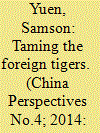

|
|
|
|
|
| Summary/Abstract |
Thirty years after the launch of the “reform and opening up” policy, China finally implemented its first anti-trust law in 2008, a move lauded by an international law firm as a “tremendous leap forward” that brought the country “squarely into the modern world of antitrust and competition law.”(1)Yet, given the law’s novelty on Chinese soil, few would have expected China to suddenly begin aggressively enforcing it. Since 2013, Chinese anti-trust regulators have become active in deploying the anti-trust law to initiate probes and impose hefty fines on industry associations, foreign carmakers, eyewear makers, and baby formula manufacturers, meanwhile justifying “dawn raids” on selected firms. Many of their high-profile targets are multinational firms that until then enjoyed a comfortable presence in China. Facing tightened enforcement, foreign companies and chambers of commerce are complaining that regulators are using the law selectively against foreign firms and that investigations lack transparency and respect for the rule of law.Chinese regulators, on the other hand, argue that they are impartial towards domestic and foreign companies, and that they are merely enforcing the anti-trust law in order to create a level playing field for both domestic and foreign companies, benefit Chinese consumers, and bring China closer to the rule of law.
|
|
|
|
|
|
|
|
|
|
|
|
|
|
|
|
| 17 |
ID:
086089
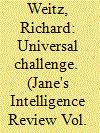

|
|
|
| 18 |
ID:
099167
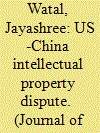

|
|
|
|
|
| Publication |
2010.
|
| Summary/Abstract |
This article focuses on the significance of the US-China intellectual property panel report in terms of the light it shed on the interpretation of certain provisions on domestic enforcement contained in part III of the Agreement on Trade-Related Aspects of Intellectual Property Rights (TRIPS). The panel made several important observations in respect of certain TRIPS domestic enforcement provisions either reinforcing views previously held, adding further meaning or shedding new light on these provisions, explaining its reasoning, and including, on several occasions, an examination of the negotiating history of TRIPS. This article picks out certain key points of interpretation by way of illustrating the significant contribution made by the panel to TRIPS jurisprudence.
|
|
|
|
|
|
|
|
|
|
|
|
|
|
|
|
| 19 |
ID:
188876
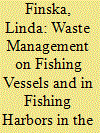

|
|
|
|
|
| Summary/Abstract |
This article aims to map and provide an overview of international, regional, and national law applicable to marine waste in the Barents Sea, and to analyze fishing industry actors’ practices and perceptions of marine waste. We identify gaps between the law and its implementation, enforcement, and practice. The legal framework for marine plastic pollution in the Barents Sea and the Arctic is fragmented and not harmonized. Insufficient waste management facilities and regulations are likely to hinder compliance with existing regulations. There is an urgent need to upgrade the waste management infrastructure for the fishing industry in Norway and in northwest Russia.
|
|
|
|
|
|
|
|
|
|
|
|
|
|
|
|
| 20 |
ID:
087458
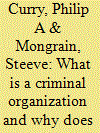

|
|
|
|
|
| Publication |
2009.
|
| Summary/Abstract |
The Criminal Codes in both Canada and the United States allow for criminals to be penalized to a greater degree if they are a member of an organization. We draw on the economic theory of punishment, which states that expected penalty should be proportional to the social harm caused, to put a different perspective on such regulations. According to the economic theory, additional punishments are desirable if either: (1) the social harm from a criminal act is greater for a member of an organization than for an independent criminal; or (2) the probability of conviction is lower. We examine the extent to which both of these possibilities are true and use the findings to revisit the definition of a criminal organization.
|
|
|
|
|
|
|
|
|
|
|
|
|
|
|
|
|
|
|
|
|